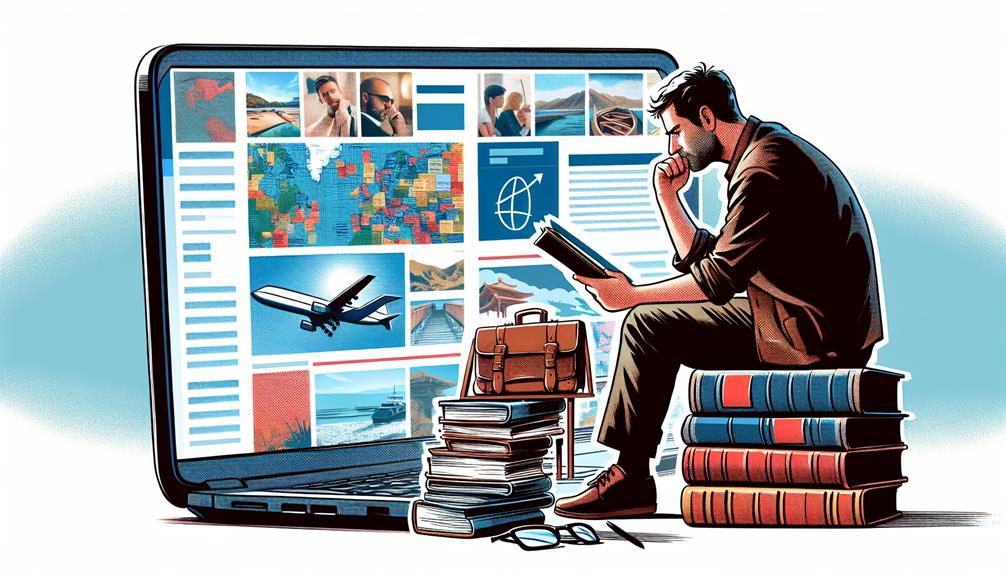Have you ever wondered if travel blogs have surpassed traditional publishing in the digital age? With the rise of technology and the ease of self-publishing, it's tempting to believe that blogs have taken over as the go-to source for travel inspiration and information. However, the truth is not as clear-cut as it may seem. In this discussion, we will explore the advantages and limitations of both blogs and traditional publishing, and how digital platforms have transformed the landscape of travel writing. So, whether you're a seasoned traveler or just looking for your next adventure, join us as we unravel the complexities and possibilities of travel writing in the digital age.
The Rise of Travel Blogs

With the advent of the internet and the increasing popularity of social media, travel blogs have emerged as a dynamic and influential platform for sharing personal experiences, inspiring wanderlust, and revolutionizing the way we consume travel content. In today's digital age, anyone with a passion for travel can create their own blog and share their adventures with the world. The rise of travel blogs has opened up new avenues for individuals to express themselves creatively and connect with like-minded travelers.
One of the key aspects that differentiate travel blogs from traditional publishing is the ability to monetize their platforms. Bloggers can leverage their online presence to collaborate with brands, promote products, and earn income through sponsored posts, affiliate marketing, and advertising. This monetization strategy allows travel bloggers to turn their passion into a viable career, giving them the freedom to explore the world while sharing their experiences with others.
However, with the rise of commercialization, the question of authenticity arises. Many readers seek genuine and unbiased travel content, free from hidden agendas or biased promotions. Travel bloggers face the challenge of maintaining their authenticity while also engaging in partnerships and sponsorships. Striking the right balance between commercialization and authenticity is crucial for bloggers to maintain credibility and preserve the trust of their audience.
Advantages of Traditional Publishing
Traditional publishing offers a multitude of advantages in the world of travel writing. While travel blogs have become increasingly popular in the digital age, there are distinctive benefits to publishing your travel writing through traditional channels. One such advantage is credibility. When your work is published by a reputable travel publication or book publisher, readers perceive your writing as more credible and trustworthy. This can be especially important when writing about lesser-known destinations or providing travel advice. Traditional publishing also offers a wider reach. With the backing of a well-established publisher, your work can reach a larger audience through bookstores, libraries, and online platforms. This wider reach can help your travel writing gain recognition and exposure. Additionally, traditional publishing allows for a personal connection with readers. Holding a physical book or magazine in your hands creates a tangible connection and a sense of intimacy that online platforms may lack. Readers can experience your travel adventures in a more immersive way. So, while travel blogs offer authenticity and a more personal touch, traditional publishing provides credibility and a wider reach for your travel writing. Ultimately, the decision between the two depends on your goals and the audience you wish to engage with.
Limitations of Travel Blogs

While traditional publishing offers numerous advantages in the world of travel writing, it is important to consider the limitations of travel blogs as well. While blogs have revolutionized the way we consume travel content, they do come with their fair share of drawbacks.
One of the limitations of travel blogs is the commercialization impact. As blogs become more popular and influential, it is increasingly common for bloggers to partner with brands and promote products or services. While this may provide financial support for the blogger, it can also compromise the authenticity and objectivity of their content. Readers may question the credibility of the information provided, wondering if it is genuinely based on personal experiences or if it is biased by commercial interests.
Furthermore, the lack of credibility is another limitation of travel blogs. Unlike traditional publishing, where articles go through a rigorous editorial process, blogs are often self-published and lack the same level of fact-checking and accountability. This can lead to misinformation, inaccuracies, and a general lack of trust in the content.
While travel blogs offer a platform for individual voices and unique perspectives, it is important for readers to approach them with a critical eye. By being aware of the commercialization impact and the potential lack of credibility, readers can navigate the world of travel blogs more discerningly and make informed decisions about the information they consume.
The Power of Digital Platforms
Digital platforms have revolutionized the travel industry, providing travelers with endless opportunities to explore destinations, connect with locals, and share their experiences with a global audience. The power of these platforms lies in their ability to connect people from all corners of the world, fostering a sense of community and inspiring wanderlust. One of the most significant impacts of digital platforms on travel writing is the rise of influencer marketing. Influencers, with their large online following, have become key players in promoting destinations and experiences. Through captivating photos, engaging videos, and personal stories, they inspire their audience to explore new places and try new things.
Moreover, digital platforms have opened up new monetization strategies for travel writers. In the past, traditional publishing was the primary avenue for earning income. However, with the advent of digital platforms, writers can now leverage their online presence to generate revenue. This includes sponsored content, collaborations with brands, and affiliate marketing. By partnering with travel-related companies, writers can not only fund their adventures but also provide valuable recommendations to their audience.
Challenges Faced by Traditional Publishers

With the rapid growth of digital platforms, traditional publishers in the travel writing industry are facing a multitude of challenges. As the world becomes increasingly digital, traditional publishers are struggling to keep up with the changing landscape. Here are three major challenges they are currently facing:
- Declining readership: With the rise of blogs and online travel content, traditional publishers are seeing a decline in readership. Readers now have access to a vast array of travel information at their fingertips, making it harder for traditional publishers to compete for their attention.
- Slow adaptation to digital platforms: Traditional publishers have been slow to adapt to the digital revolution. Many are still focused on print publications, while digital platforms continue to dominate the travel writing industry. This slow adaptation has put traditional publishers at a disadvantage, as they struggle to reach a wider audience and keep up with the changing preferences of readers.
- Increased competition: With the rise of travel blogs and social media influencers, traditional publishers are facing more competition than ever before. Bloggers and influencers have built large followings and have the ability to connect directly with readers on a personal level. This has made it harder for traditional publishers to stand out and attract readers to their publications.
These challenges highlight the need for traditional publishers to embrace digital platforms and adapt to the changing landscape of travel writing. By doing so, they can remain relevant in an ever-evolving industry and continue to engage readers in meaningful ways.
Finding a Balance: Collaborations and Hybrid Approaches
To find a balance between traditional publishing and digital platforms in the travel writing industry, collaboration and hybrid approaches are key. Collaborative initiatives and innovative strategies have become essential in navigating the ever-evolving landscape of the digital age.
One way to achieve this balance is through partnerships with other travel writers, bloggers, and influencers. By teaming up with like-minded individuals, you can pool your resources, knowledge, and experiences to create engaging and diverse content. This collaboration not only expands your reach but also allows you to tap into different audiences and perspectives.
Another approach is to adopt a hybrid model, where you combine traditional publishing with digital platforms. This can involve writing for both print publications and maintaining a travel blog or social media presence. By doing so, you can leverage the credibility and reach of traditional publishing while also taking advantage of the immediacy and interactivity of digital platforms.
Furthermore, embracing innovative strategies is crucial in today's digital age. This can include experimenting with different content formats, utilizing new technologies such as virtual reality or live streaming, and actively engaging with your audience through comments, polls, and contests.
Conclusion
So, after weighing the pros and cons of travel blogs versus traditional publishing, it seems like we've come full circle. While travel blogs have revolutionized the way we consume travel content, traditional publishing still holds its ground with its credibility and legacy. It's ironic how the digital age has given rise to both the democratization of travel writing and the challenges faced by traditional publishers. In this ever-evolving landscape, finding a balance between the two seems to be the key to success. Happy travels and happy reading!